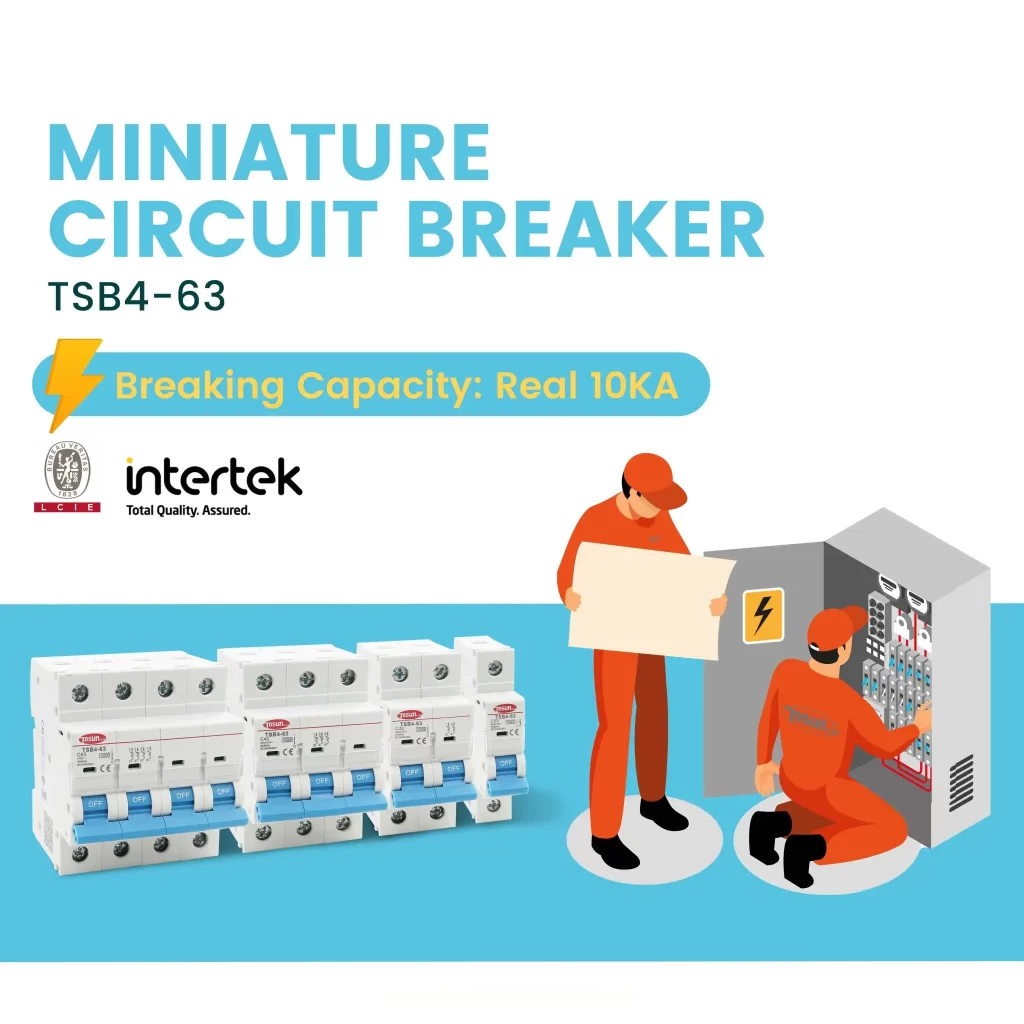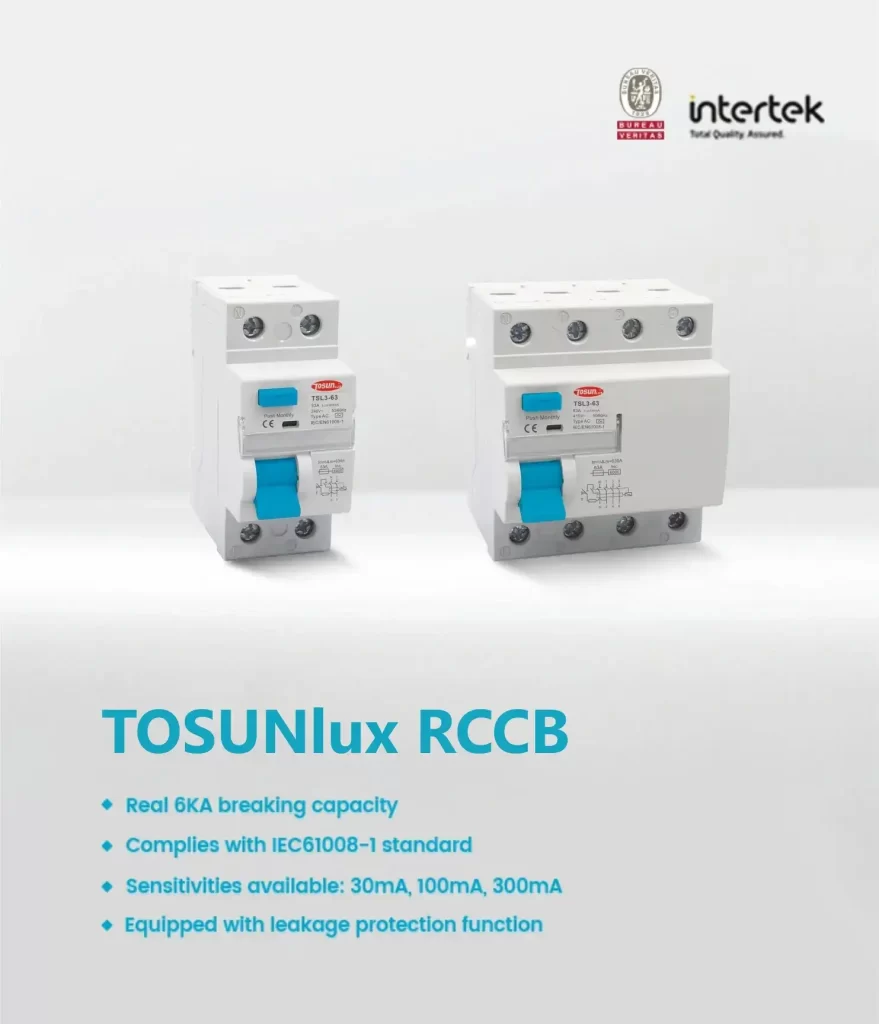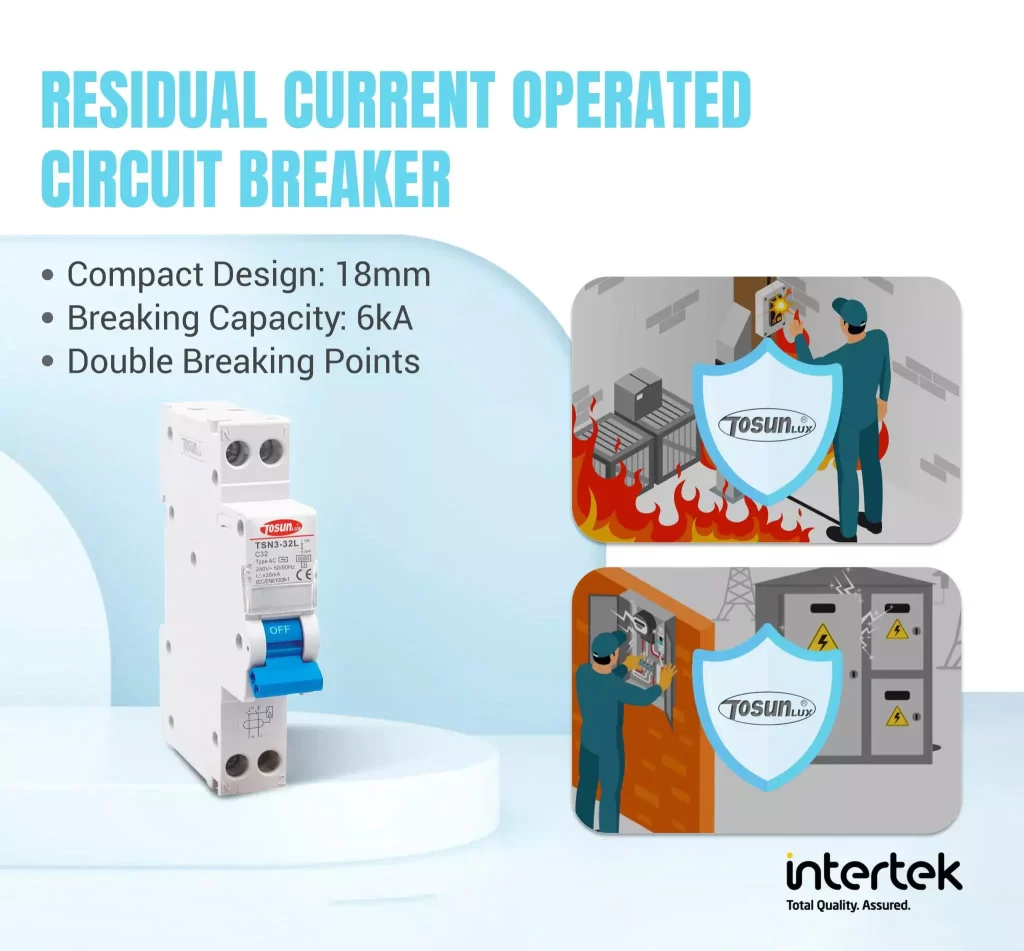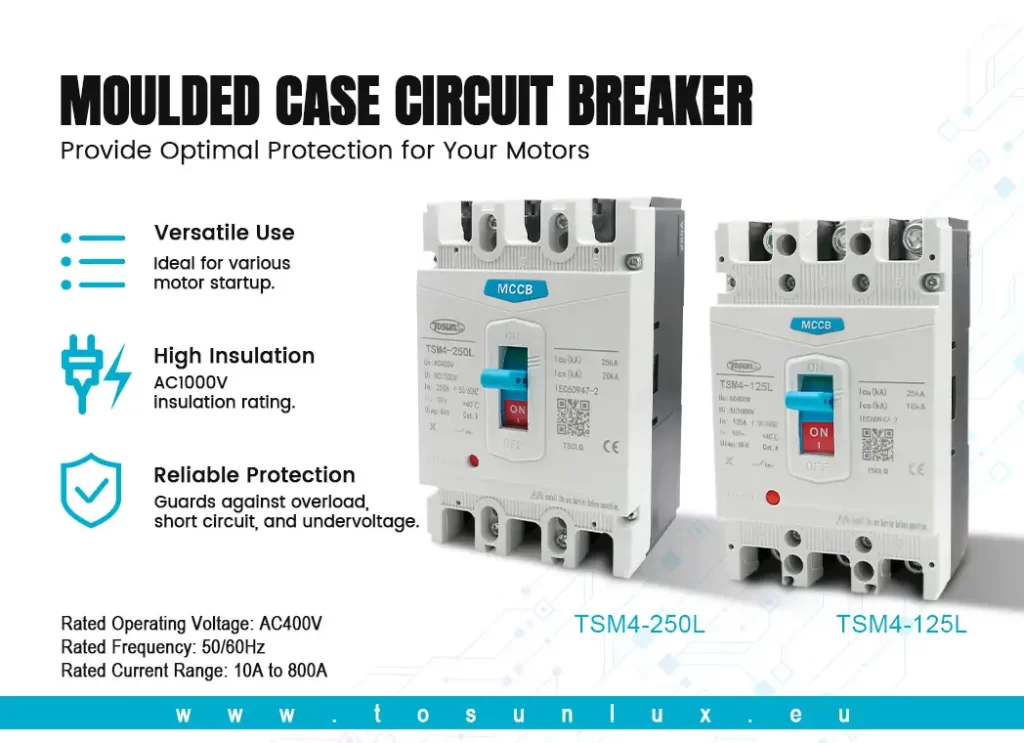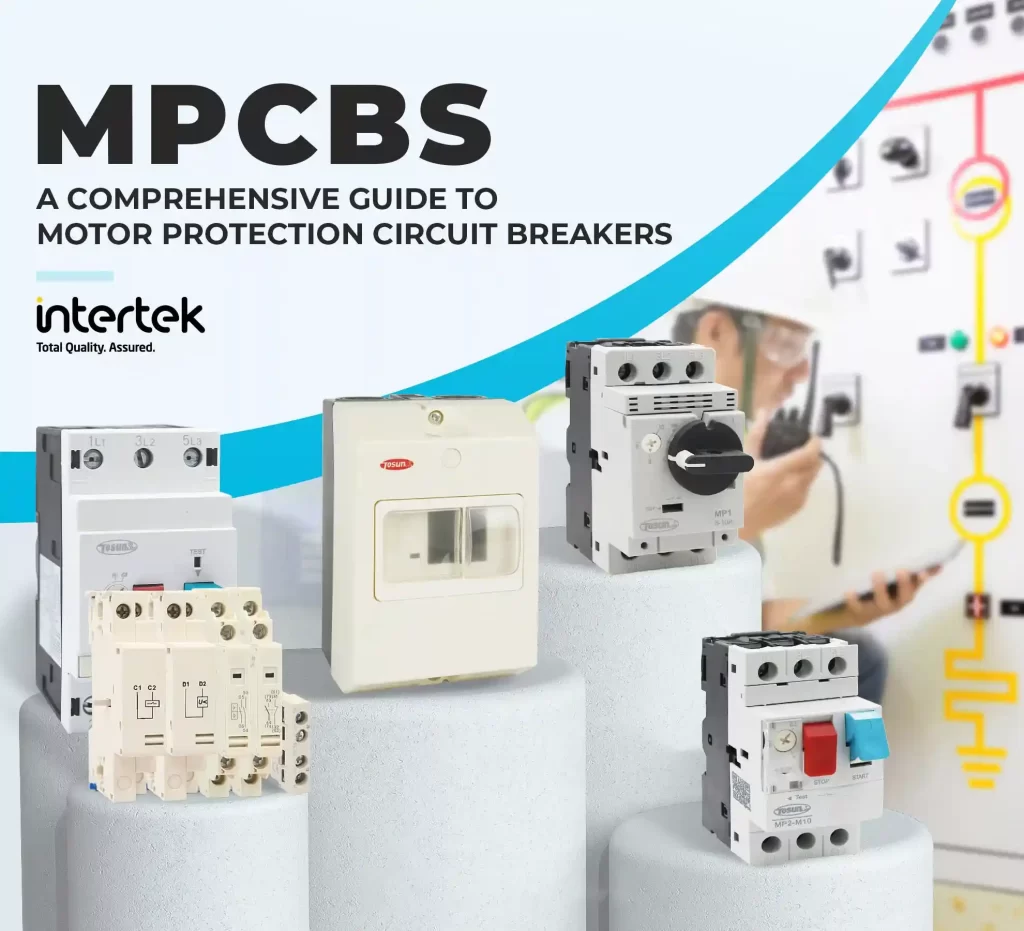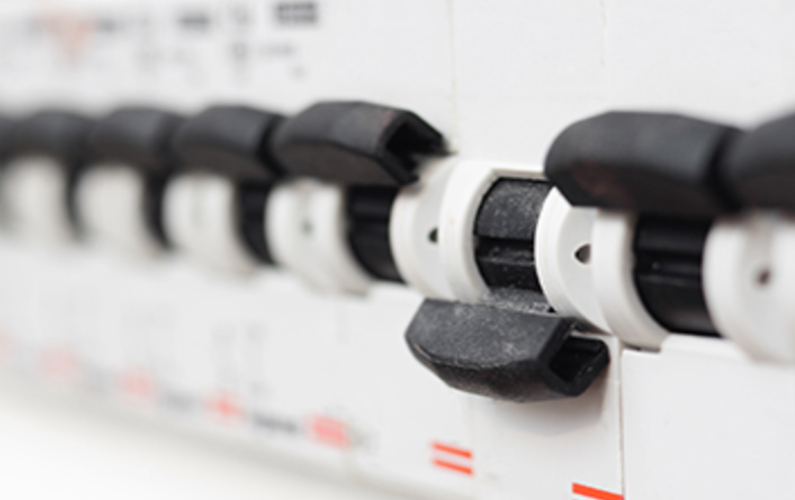MCB, RCCB, RCBO, MCCB ve MPCB Karşılaştırması: En İyi B2B Seçim Rehberi
İçindekiler
GeçişÖnemli Noktalar
- İçin elektrik toptancıları, pano üreticileri ve müteahhitlerDoğru devre kesiciyi seçmek kritik öneme sahiptir, ancak MCB, RCCB, RCBO, MCCB ve MPCB arasındaki farklar kafa karıştırıcı olabilir. Bu makale, bu farkları açıklığa kavuşturmak için tek noktadan, kesin bir rehber sunmaktadır.
- MCB, 125A'ya kadar aşırı yük ve kısa devrelere karşı koruma sağlar, RCCB toprak kaçağı koruması sağlarken, RCBO kapsamlı koruma için her iki işlevi tek bir cihazda birleştirir
- MCCB, endüstriyel uygulamalar için ayarlanabilir tetikleme ayarlarıyla 100-2500A akım değerlerini idare ederken, MPCB benzersiz tetikleme özellikleriyle motor korumasında uzmanlaşmıştır
- MCB, MCCB ve diğer elektrik koruma cihazları arasındaki farkı anlamak, uygun elektrik sistemi tasarımı ve güvenlik uyumluluğu için çok önemlidir
- Doğru devre kesici seçimi, elektrik profesyonelleri için kurulum verimliliğini, güvenlik uyumluluğunu ve uzun vadeli bakım maliyetlerini doğrudan etkiler
Hızlı Referans Karşılaştırma Tablosu
| Cihaz Türü | Ad Soyad | Birincil İşlev | Karşı Korur | Tipik Uygulama | TOSUNlux İlgili Seri |
|---|---|---|---|---|---|
| MCB | Minyatür Devre Kesici | Aşırı Akım Koruması | Aşırı Yük, Kısa Devre | Konut, Hafif Ticari | TSMCB Serisi |
| RCCB | Kaçak Akım Devre Kesici | Toprak Kaçağı Koruması | Elektrik Çarpması, Toprak Kaçağı | Islak Yerler, Personel Güvenliği | TSRCCB Serisi |
| RCBO | Aşırı Akım Korumalı Kaçak Akım Devre Kesici | Kombine Koruma | Aşırı Yük, Kısa Devre, Toprak Kaçağı | Modern Kurulumlar, Kritik Devreler | TSRCBO Serisi |
| MCCB | Kalıplanmış Kasa Devre Kesici | Yüksek Akım Koruması | Aşırı Yük, Kısa Devre (Yüksek Kapasite) | Endüstriyel, Ticari Besleyiciler | TSMCCB Serisi |
| MPCB | Motor Koruma Devre Kesici | Motora Özel Koruma | Motor Aşırı Yükü, Faz Kaybı, Kısa Devre | Endüstriyel Motorlar, Pompalar | TSMPCB Serisi |
MCB (Minyatür Devre Kesici) Nedir?
A minyatür devre kesici (MCB), anormal koşullar altında elektrik devrelerini otomatik olarak kapatmak için tasarlanmış bir elektromekanik cihazdır, örneğin: aşırı yüklenmeler veya kısa devrelerModern elektrik tesisatlarında hem kablolama sistemlerini hem de bağlı elektrikli cihazları korumak için temel bir bileşen olarak görev yapan, en yaygın kullanılan elektrik koruma cihazlarından biridir.
Çalışma Prensibi
MCB'ler termal-manyetik bir tetikleme mekanizması kullanarak çalışır:
Manyetik Eleman: Kısa devre arızalarına anında tepki veren elektromıknatıs, hızlı bağlantı kesmeyi sağlar.
Termal Eleman: Bimetalik şerit, aşırı akım akışı nedeniyle ısındığında bükülerek, sürekli aşırı yüklenmelere karşı koruma sağlar.
Temel Özellikler ve Avantajlar

- Birincil Koruma: Aşırı yük ve kısa devre durumlarına karşı koruma sağlar.
- Güncel Derecelendirmeler: Genellikle 0,5A'den 125A'e kadar akımları idare eder, düşük enerji gereksinimleri ve düşük devreler için uygundur.
- Kompakt Tasarım: Konut uygulamaları, küçük ticari binalar, aydınlatma devreleri ve küçük elektronik devreler için idealdir.
- Sıfırlanabilir İşlem: Sigortaların aksine, MCB'ler devre dışı kaldıktan hemen sonra sıfırlanabilir, bu sayede arıza süresi ve bakım maliyetleri azalır.
- Yerden Tasarruflu Kurulum: Tüketici birimlerine kolayca sığar ve dağıtım panoları.
- Güvenilir Performans: Elektrik yükleri ve kablolama sistemleri için tutarlı koruma sağlar.
→TOSUNlux'un 90'dan fazla ülkeye tedarik ettiği MCB ürünlerinin tüm yelpazesini keşfedin.
RCCB (Kaçak Akım Korumalı Devre Kesici) Nedir?
A Kaçak Akım Devre Kesici (RCCB), aynı zamanda bir Kaçak Akım Cihazı (RCD), öncelikle toprağa akan kaçak akımları tespit ederek elektrik çarpmasını önlemek için tasarlanmış kritik bir elektrik koruma cihazıdır. Temel amacı, bir elektrik devresindeki canlı ve nötr iletkenler arasındaki akım dengesini izleyerek insan güvenliğini artırmaktır.
RCCB Nasıl Çalışır?
- Mevcut İzleme: RCCB bir akım trafosu Canlı ve nötr kablolardan geçen akımı sürekli olarak karşılaştırmak.
- Dengeli Akım: Normal şartlarda canlı iletkenden geçen akım, nötr iletkenden dönen akıma eşit olur ve bunun sonucunda trafoda net akım sıfır olur.
- Sızıntı Tespiti: Topraklama hatası meydana geldiğinde (örneğin topraklama kablosundan veya insan vücudundan akım sızdığında) akımlar dengesiz hale gelir.
- Hızlı Bağlantı Kesme: Bu dengesizliği tespit eden RCCB, 30 milisaniye içerisinde devreyi açarak elektrik çarpması veya yangın tehlikesini önler.
Temel Özellikler
- Koruma Kapsamı: Kaçak akım koruma röleleri (RCCB'ler) yalnızca toprak kaçağı akımlarına karşı koruma sağlar ve aşırı yük veya kısa devreye karşı koruma sağlamaz.
- Duyarlılık Derecelendirmeleri: Çeşitli hassasiyet seviyelerinde mevcuttur, bunlar şunlardır:
- Yüksek hassasiyetli kişisel koruma için 10mA (örneğin tıbbi ortamlar)
- Standart konut ve ticari uygulamalar için 30mA
- Ekipman ve yangın koruma amaçları için 100mA ila 300mA
- Tipik Uygulamalar: Elektrik çarpması riskinin yüksek olduğu banyo, mutfak, dış devreler ve yüzme havuzları gibi ıslak veya yüksek riskli yerlerde olmazsa olmazdır.
Önemli Hususlar
- Tüm elektriksel arızalara karşı kapsamlı koruma sağlamak için RCCB'ler Minyatür Devre Kesiciler (MCB'ler) veya diğer aşırı akım koruma cihazlarıyla birlikte kullanılmalıdır.
- Genellikle MCB'lerle birlikte elektrik panolarına (tüketici üniteleri) monte edilerek komple bir güvenlik sistemi oluşturulur.
RCCB'leri elektrik tesisatlarına entegre ederek, elektrik mühendisleri ve profesyonelleri elektrik çarpması riskini önemli ölçüde azaltabilir ve konut, ticari ve endüstriyel ortamlarda genel güvenlik uyumluluğunu artırabilirler.
→TOSUNlux'un 90'dan fazla ülkeye tedarik ettiği RCCB ürünlerinin tüm yelpazesini keşfedin.
RCBO (Aşırı Akım Korumalı Kaçak Akım Sigortası) Nedir?
RCBO, hem MCB hem de RCCB'nin işlevlerini tek bir kompakt elektrikli cihazda birleştirerek elektrik koruma teknolojisinin gelişimini temsil eder. Aşırı akım korumalı bu kaçak akım kesici, üç farklı koruma türü sağlar:
- Aşırı Yük Koruması: Aşırı ısınmaya neden olabilecek sürekli aşırı akımdan elektrik devresini korur.
- Kısa Devre Koruması: Ani yüksek akım arızalarında devreyi hızla keserek hasarı önler.
- Kaçak Akım Koruması: Toprağa olan kaçak akımları tespit ederek elektrik çarpması ve yangın tehlikelerine karşı koruma sağlar.
Çalışma Prensibi
RCBO, aşırı akım koruması için termal-manyetik tetikleme mekanizmalarını, toprak kaçağı koruması için diferansiyel akım algılama özelliğiyle birleştirir. Bu çift etkili koruma, anormal koşullar altında devrenin otomatik olarak kesilmesini sağlayarak, ayrı cihazlara ihtiyaç duymadan kapsamlı güvenlik sağlar.
Temel Avantajlar
- Alan Verimliliği: Modern elektrik tesisatlarında değerli pano alanından tasarruf sağlayarak MCB ve RCCB fonksiyonlarını tek bir cihazda birleştirir.
- Basitleştirilmiş Kurulum: Birden fazla koruma cihazına olan ihtiyacı ortadan kaldırarak kablolama karmaşıklığını ve olası hataları azaltır.
- Kapsamlı Koruma: Tek bir ünitede aşırı yüklere, kısa devrelere ve toprak kaçağına karşı tam koruma sağlar.
- Uygulama Çok Yönlülüğü: Modern konut binaları, ticari tesisler ve gelişmiş güvenlik gerektiren kritik devreler için idealdir.
Dikkate alınması gereken hususlar
RCBO'lar genellikle ayrı MCB ve RCCB kombinasyonlarına kıyasla daha yüksek bir ilk maliyete sahip olsa da, kurulum süresinde önemli tasarruflar, azaltılmış panel alanı gereksinimleri ve daha düşük uzun vadeli bakım çabaları sunarlar.
→TOSUNlux'un 90'dan fazla ülkeye tedarik ettiği RCBO ürünlerinin tüm yelpazesini keşfedin.
MCCB'yi (Kalıplanmış Kasa Devre Kesici) Anlamak
Genel bakış
A Kalıplanmış Kasa Devre Kesici (MCCB), elektrik çarpmasına karşı koruma için tasarlanmış yüksek kapasiteli bir elektrik koruma cihazıdır. endüstriyel ve büyük ticari uygulamalarMinyatür Devre Kesicilerden (MCB) daha yüksek akım değerlerini kaldırabilir ve zorlu elektrik sistemlerine uygun gelişmiş koruma özellikleri sunar.
Tasarım ve İnşaat
"Kalıplanmış kasa", karmaşık kablolama sistemlerini korumak için gerekli olan mekanik dayanıklılık ve etkili ark kesintisi sağlayan dayanıklı yalıtım muhafazasını ifade eder.
Temel Özellikler
- Mevcut Değerler ve Kesme Kapasitesi: MCCB'ler 100A ile 2500A arasındaki akımları idare eder kesinti kapasiteleri Genellikle 16kA ile 85kA arasında olup, yüksek kısa devre akımlarının güvenli bir şekilde kesilmesini sağlar.
- Ayarlanabilir Gezi Ayarları: MCCB'ler aşırı yük ve kısa devre tetikleme ayarlarının hassas bir şekilde ayarlanmasını sağlayarak, istenmeyen tetiklemeleri önler ve diğer cihazlarla seçici koordinasyona olanak tanır.

- Gelişmiş İşlevler: Birçok modelde elektronik gezi üniteleri, haberleşme yetenekleri ve enerji izleme özellikleri yer alıyor ve motor operatörleri ve uzaktan kumanda ile entegrasyonu destekliyor.
- Kapsamlı Koruma: Aşırı yüklenmelere, kısa devrelere ve isteğe bağlı olarak topraklama hatalarıBu da onları çeşitli uygulamalar için çok yönlü hale getirir.
- Yardımcı Özellikler: Yardımcı kontaklar ve diğer koruma cihazlarıyla uyumluluk, karmaşık sistemlerde işlevselliğini artırır.
Uygulamalar
MCCB'ler, özellikle yüksek güç kapasitesi ve ayarlanabilir korumanın gerekli olduğu endüstriyel motor besleyicilerinde, büyük HVAC sistemlerinde, trafo korumalarında ve ticari dağıtım panellerinde olmazsa olmazdır.
Özet
MCCB'ler, MCB'lerden temel olarak kapasite ve ayarlanabilirlik açısından farklılık gösterir ve özelleştirilebilir koruma ile yüksek enerji ihtiyacı olan bölgelere hitap eder. Sağlam tasarımları ve özellikleri, endüstriyel ve ticari kullanım için güvenilir ve verimli elektrik sistemi güvenliği sağlar.
→TOSUNlux'un 90'dan fazla ülkeye tedarik ettiği MCCB ürünlerinin tüm yelpazesini keşfedin.
Temel Karşılaştırma: ELCB ve RCCB
giriiş
Toprak Kaçak Akım Devre Kesici (ELCB) teknolojisinden modern Kaçak Akım Devre Kesici (RCCB) teknolojisine geçişi anlamak, özellikle eski tesisatlarla uğraşan veya yenileme planlayan elektrik profesyonelleri için çok önemlidir. Bu karşılaştırma, her iki cihazın temel farklılıklarını, avantajlarını ve güvenlik etkilerini vurgulamaktadır.
ELCB nedir?
- Tanım: ELCB, esas olarak 1960'lar ve 1980'ler arasında kullanılan eski, voltajla çalışan bir toprak kaçağı koruma cihazıdır.
- Çalışma Prensibi: Topraklama iletkenindeki gerilim artışını izleyerek topraklama hatalarını tespit eder.
- Sınırlamalar:
- Topraklama elektrodu bağlantısının bütünlüğüne bağlıdır.
- Bazı toprak arıza tiplerini tespit edemeyebilir.
- Modern cihazlara kıyasla sınırlı hassasiyet ve daha yavaş tepki.
- Durum: Çağdaş dünyada modası geçmiş teknoloji olarak kabul edilir elektrik güvenliği standartlar.
RCCB nedir?
- Tanım: Kaçak Akım Cihazı (RCD) olarak da bilinen RCCB, toprağa olan kaçak akımları tespit etmek için tasarlanmış akıma duyarlı bir elektrik koruma cihazıdır.
- Çalışma Prensibi: Akım trafosu kullanılarak canlı ve nötr iletkenler arasındaki akım dengesi sürekli olarak izlenir.
- Avantajları:
- Toprak elektrot koşullarına bağlı değildir, daha güvenilir koruma sağlar.
- Kaçak akımlara karşı daha yüksek hassasiyet, daha hızlı ve daha doğru tespit sağlar.
- IEC 61008 gibi uluslararası güvenlik standartlarına uygundur.
- Elektrik çarpması ve yangın tehlikelerini önlemek için milisaniyeler içinde (genellikle 30 ms) devreye girer.
- Uygulamalar: Konut, ticari ve endüstriyel elektrik tesisatlarında insan güvenliğini artırmak için yaygın olarak kullanılır.
Karşılaştırmalı Özet
| Özellik | ELCB | RCCB |
|---|---|---|
| Teknoloji Türü | Voltajla çalışan | Akımla çalıştırılan |
| Hassasiyet | Sınırlı, toprak bağlantısına bağlı | Yüksek, toprak bağlantısından bağımsız |
| Arıza Tespiti | Toprak iletkeninde gerilim artışı | Canlı ve nötr arasındaki mevcut dengesizlik |
| Tepki Süresi | Yavaş | Hızlı (genellikle 30 milisaniye içinde) |
| Güvenilirlik | Dünya bütünlüğüne bağımlılık nedeniyle daha düşük | Mevcut izleme nedeniyle daha yüksek |
| Uyumluluk | Güncelliğini yitirmiş, modern standartlara uygun değil | IEC 61008 ve diğer standartlara uygundur |
| Başvuru Durumu | Çoğunlukla aşamalı olarak kullanımdan kaldırıldı | Modern elektrik güvenliğinde standart |
Elektrik Profesyonelleri İçin Öneriler
- Yenisiyle değiştirme: Elektrik mühendisleri ve teknisyenleri, bakım veya yükseltme projeleri sırasında mevcut ELCB tesisatlarının modern RCCB'lerle değiştirilmesini önermelidir.
- Güvenlik Uyumluluğu: RCCB'lere yükseltme, mevcut güvenlik yönetmeliklerine uyumu sağlar ve elektrik çarpması ve yangın tehlikelerine karşı korumayı önemli ölçüde artırır.
- Bakım Hususları: RCCB'lerin düzgün çalıştığını doğrulamak için test butonu kullanılarak düzenli test yapılması gerekir ve bu da uzun vadeli güvenlik güvencesini artırır.
Çözüm
ELCB'den RCCB teknolojisine geçiş, elektrik güvenliğinde temel bir ilerlemeyi temsil ediyor.
RCCB'ler, akıma duyarlı çalışma, daha yüksek güvenilirlik ve daha hızlı tepki süreleri sayesinde üstün koruma sağlar. Elektrik profesyonelleri, optimum güvenlik performansı ve modern standartlara uyum sağlamak için eski ELCB sistemlerini RCCB'ye yükseltmeye öncelik vermelidir.
MCB ve MCCB: Ayrıntılı Karşılaştırma
MCB ile MCCB arasındaki fark, basit akım kapasitesinin ötesine geçerek, elektrik sistemi tasarımını etkileyen uygulamaları, özellikleri ve kurulum gereksinimlerini kapsar.
| Şartname | MCB | MCCB |
|---|---|---|
| Güncel Derecelendirme | 0,5A – 125A | 100A – 2500A |
| Kırılma Kapasitesi | 6kA – 25kA | 16kA – 200kA |
| Gezi Ayarlaması | Sabit Özellikler | Ayarlanabilir Parametreler |
| Fiziksel Boyut | Kompakt (18 mm genişlik) | Büyük (Birkaç modül) |
| Uygulamalar | Konut/Hafif Ticari | Endüstriyel/Ağır Ticari |
| Maliyet | Daha düşük | Daha yüksek |
| Kurulum | Basit eklenti | Cıvatalı bağlantılar |
MCB'ler, standart korumanın yeterli olduğu konut ve hafif ticari uygulamalarda mükemmel performans gösterir. Sabit açma özellikleri, yaygın yük tipleri için önceden tasarlanmış olup, seçim ve kurulumu kolaylaştırır. Kompakt tasarımı, tüketici ünitelerinde ve dağıtım panolarında yüksek devre yoğunluğuna olanak tanır.
MCCB'ler, yük koordinasyonu ve seçici çalışma için ayarlanabilir açma ayarlarının önemli olduğu endüstriyel ve ağır ticari uygulamalara hizmet eder.
Termal ve manyetik tetikleme noktalarının hassas bir şekilde ayarlanabilmesi, belirli uygulamalar için optimizasyona olanak tanır ve korumayı korurken istenmeyen tetiklemeleri önler.

MCB ve RCCB Arasındaki Temel Farklar Açıklandı
Minyatür Devre Kesiciler (MCB) ve Kaçak Akım Devre Kesiciler (RCCB) arasındaki temel farkları anlamak, elektrik güvenliğini ve sistem güvenilirliğini sağlamak için çok önemlidir. Bu cihazlar, elektrik korumasında farklı ancak tamamlayıcı rollere sahiptir.
Koruma Kapsamı ve Amacı
- MCB (Minyatür Devre Kesici):
Sürekli aşırı yüklenmeler ve ani kısa devreler de dahil olmak üzere elektrik devrelerini ve ekipmanlarını aşırı akım koşullarından korumak için tasarlanmıştır. MCB'ler, akım önceden belirlenmiş eşikleri aştığında bunu algılar ve kablolama ve cihazlara zarar gelmesini önlemek için devreyi otomatik olarak keser. - RCCB (Kaçak Akım Korumalı Devre Kesici):
Canlı ve nötr iletkenler arasındaki dengesizlikten kaynaklanan kaçak akımları tespit ederek insan güvenliğine odaklanır. Bu kaçak akım genellikle, potansiyel olarak insan vücudu veya yalıtım hataları yoluyla toprağa akan akımı gösterir. RCCB'ler, elektrik çarpması ve yangın tehlikelerini önlemek için hızla (30 milisaniye içinde) devreye girer.
Algılama ve Müdahale Mekanizmaları
- MCB İşlemi:
Termal ve manyetik tetikleme elemanlarından yararlanır. Termal eleman, bimetalik bir şerit aracılığıyla uzun süreli aşırı yüklenmelere tepki verirken, manyetik eleman bir elektromıknatıs aracılığıyla kısa devrelere anında tepki verir. Bu ikili mekanizma, anormal akım koşullarında güvenilir bağlantı kesme sağlar. - RCCB Çalışması:
Canlı ve nötr kablolar arasındaki akım dengesini sürekli olarak izlemek için bir akım trafosu kullanır. Normal koşullar altında akımlar eşit ve dengelidir. Önceden belirlenmiş bir hassasiyetin ötesinde herhangi bir dengesizlik, devrenin anında kesilmesine neden olur.
Kurulum ve İşlevsel Tamamlayıcılık
- Kombine Kullanım:
Kapsamlı bir elektrik koruması için, MCB ve RCCB genellikle birlikte monte edilir. MCB'ler aşırı yük ve kısa devre gibi elektrik arızalarına karşı birincil koruma sağlarken, RCCB'ler insan hayatını korumak için toprak kaçağı akımlarına karşı kritik bir koruma katmanı ekler. - Değiştirilemezlik:
Her iki cihaz da temelde farklı tehlikeleri ele aldığı için birbirinin yerini alamaz. Doğru elektrik sistemi tasarımı, bu cihazların birbirini tamamlayıcı şekilde entegre edilmesini gerektirir.
Tepki Özellikleri ve Pratik Hususlar
- MCB'nin Yanıtı:
Geçici olaylar sırasında (örneğin motor çalıştırma akımları) gereksiz yere devre dışı kalmadan kısa süreli aşırı akım koşullarına izin verir, korumayı dengeler ve operasyonel sürekliliği sağlar. - RCCB'nin Yanıtı:
Hassasiyet eşiğini aşan herhangi bir kaçak akıma anında tepki verir, elektrik çarpması riskini azaltmak için hızlı bağlantı kesmeyi önceliklendirir.
MCB'lerin ve RCCB'lerin rollerini, mekanizmalarını ve uygulamalarını net bir şekilde ayırt ederek, elektrik profesyonelleri düzenleyici standartları karşılayan ve hem ekipmanı hem de personeli etkili bir şekilde koruyan daha güvenli, daha güvenilir sistemler tasarlayabilirler.
RCCB ve RCBO: Doğru Çözümü Seçme
RCCB ile RCBO arasında seçim yapmak, elektriksel korumayı, kurulum verimliliğini ve maliyet etkinliğini optimize etmek için çok önemlidir.
RCCB (Artık Akım Devre Kesici) özel toprak kaçağı koruması sağlar ancak aşırı akım koruması için ayrı MCB'ler gerektirir.
Bu geleneksel kurulum, koruyucu cihazların bağımsız olarak boyutlandırılmasına olanak tanır, ancak daha fazla panel alanı ve paylaşımlı nötr bağlantıları da dahil olmak üzere karmaşık kablolama gerektirir. Paraziti önlemek ve güvenilir çalışmayı sağlamak için cihazlar arasında uygun koordinasyon şarttır.
RCBO (Aşırı Akım Korumalı Kaçak Akım Kesici) Toprak kaçağı ve aşırı akım korumasını tek bir cihazda birleştirir. Bu entegre çözüm, ayrı MCB'lere ve ortak nötrlere olan ihtiyacı ortadan kaldırarak kurulumu basitleştirir, kablolama karmaşıklığını azaltır ve kurulum hatalarını en aza indirir.
RCBO'lar genellikle RCCB artı MCB kombinasyonlarına göre daha yüksek ilk maliyetlere sahip olsa da, değerli panel alanından tasarruf sağlar ve işçilik maliyetlerini azaltır, bu da onları genel olarak uygun maliyetli hale getirir.
Temel Hususlar:
- Kurulum Karmaşıklığı: RCBO'lar kablolamayı kolaylaştırır ve olası arızaları azaltır; RCCB'ler ise daha dikkatli bir koordinasyon gerektirir.
- Panel Alanı: RCBO'lar değerli alan tasarrufu sağlar, yenileme veya alan kısıtlaması olan paneller için idealdir.
- Maliyet: RCBO üniteleri tek başlarına daha pahalı olsa da, montaj verimliliği hesaba katıldığında toplam maliyetler daha düşük olabilir.
Elektrik profesyonelleri, en uygun koruma stratejisini seçmek için uygulama ihtiyaçları, panel kısıtlamaları ve bütçe temelinde bu faktörleri değerlendirmelidir.
Özel Karşılaştırma: Motor Koruması için MPCB ve MCB / MCCB Karşılaştırması
MPCB nedir?
A Motor Koruma Devre Kesici (MPCB), elektrik motorlarının benzersiz gereksinimlerine özel olarak tasarlanmış, özel bir elektrik koruma cihazıdır. Kapsamlı koruma sağlayarak şunları sağlar: motor-spesifik koşullar örneğin:
- Yüksek Ani Akımlar: Motorlarda tipik olarak görülen büyük başlangıç akımlarını, rahatsız edici bir tetikleme olmadan idare eder.
- Termal Aşırı Yük Koruması: Trip Class 10 veya 20 özelliklerine sahip ayarlanabilir termal aşırı yük ayarları, uzun süreli çalışma sırasında motorların aşırı ısınmasını önler.
- Faz Arızası Tespiti: Üç fazlı motorları korur tek fazlı Motorun hızlı bir şekilde hasar görmesine neden olabilecek durumlar.
MPCB'lerin Temel Özellikleri
- Ayarlanabilir Termal Aşırı Yük Ayarları: Motor karakteristiklerinin hassas bir şekilde ayarlanmasını sağlayarak, normal motor çalıştırma akımları sırasında gereksiz triplerin önlenmesini sağlar.
- Faz Kaybı Tespiti: Üç fazlı motorların zararlı faz dengesizliklerine veya kayıplara karşı korunması için gereklidir.
- Manuel Motor Kontrol Fonksiyonları: Genellikle START/STOP butonlarını içerir, korumaya ek olarak motor çalışmasının doğrudan kontrolüne olanak tanır.
MPCB ve MCB
- Uzmanlaşma ve Genel Koruma: MPCB'ler özellikle motor koruması için tasarlanmıştır, MCB'ler ise sabit trip ayarlarıyla genel devre koruması sağlar.
- Gezi Ayarları: MPCB'ler motor çalışması için optimize edilmiş ayarlanabilir termal trip ayarları sunar; MCB'ler motor çalıştırma sırasında istenmeyen kesintilere neden olabilecek sabit trip özelliklerine sahiptir.
- İşlevsellik: MPCB'ler genellikle manuel motor kontrol yetenekleri içerir; MCB'ler ise kontrol özellikleri olmadan yalnızca koruma cihazları olarak hizmet verir.
MPCB ve MCCB
- Uygulama Kapsamı: MPCB'ler, tüm gerekli motor koruma fonksiyonlarını entegre eden, bireysel veya daha küçük motorlar için kompakt ve uygun maliyetli çözümlerdir.
- MCCB'ler: Genellikle daha büyük motorlar için besleme kesicileri olarak kullanılır ve harici güç gerektirebilir termal aşırı yük röleleri Motorun tam korunması için.
- Entegrasyon: MPCB'ler motor korumasını ve kontrolünü tek bir cihazda birleştirir, oysa MCCB'lerin aynı seviyede motor korumasına ulaşmak için ek bileşenlere ihtiyacı olabilir.
Tipik Uygulamalar
MPCB'ler, motorlara özgü koruma özelliklerinin ve manuel kontrol fonksiyonlarının kritik öneme sahip olduğu motor, pompa, kompresör, konveyör sistemleri ve HVAC ekipmanlarının bulunduğu endüstriyel ortamlarda mükemmel performans gösterir. Seçim kriterleri arasında motor tam yük amperajı (FLA), çalıştırma özellikleri, görev döngüsü ve çevre koşulları yer alır.
→TOSUNlux'un 90'dan fazla ülkeye tedarik ettiği MPCB ürünlerinin tüm yelpazesini keşfedin.
Doğru Devre Kesiciyi Nasıl Seçersiniz: Uygulamanız İçin B2B Rehberi
Uygun elektrik koruma cihazlarının seçilmesi, farklı sektörlerdeki elektrik tesisatlarını etkileyen uygulama gereksinimlerini, yük özelliklerini ve güvenlik yönetmeliklerini anlamayı gerektirir.
Konut Uygulamaları
MCB'ler genellikle standart koruma özelliklerine sahip genel aydınlatma ve priz devrelerini yönetir. RCCB'ler veya RCBO'lar, elektrik çarpması riskinin yüksek olduğu banyo, mutfak ve dış mekan devreleri gibi ıslak alanlar için olmazsa olmazdır. Modern tesisatlar, tüm son devreler için RCBO'ları giderek daha fazla tercih ederek, kapsamlı koruma sağlarken kurulum ve bakımı da basitleştirir.

Ticari Uygulamalar
Daha büyük ticari binalar, daha küçük yükler için MCB'ler, yüksek riskli alanlar için RCCB'ler ve ana dağıtım panelleri için MCCB'lerin kombinasyonlarını gerektirir. RCBO'lar, hem aşırı akım hem de toprak kaçağı korumasının önemli olduğu kritik veya ortak alanlar için tercih edilir. Yük çeşitliliği ve koordinasyon çalışmaları, optimum koruma şemalarının belirlenmesine yardımcı olur.
Endüstriyel Uygulamalar
MCCB'ler genellikle ana dağıtım noktalarına, alt akış cihazlarıyla koordinasyon için ayarlanabilir tetikleme ayarlarıyla hizmet verir. MPCB'ler, bireysel motorlar, pompalar ve endüstriyel ekipmanlar için özel koruma sağlar. RCCB'ler ise, çalışanların enerjili ekipmanlarla temas edebileceği alanlarda personel güvenliğini sağlar.
Güneş PV Sistemleri
Fotovoltaik tesisler, dizi koruması için DC dereceli MCB'ler ve invertör çıkış koruması için AC RCBO'lar gerektirir. PV sistemlerindeki DC ark oluşumu ve yangın risklerinin benzersiz özellikleri, güneş enerjisi uygulamaları için tasarlanmış özel devre kesiciler gerektirir.
Koordinasyon çalışmaları, seçici işletme gereksinimleri veya özel uygulamalar içeren karmaşık kurulumlar için profesyonel danışmanlık olmazsa olmazdır. Elektrik mühendisleri, optimum sistem performansı ve güvenlik uyumluluğunu sağlamak için yük analizi, arıza seviyesi hesaplamaları ve koruma koordinasyonu sağlayabilir.
TOSUNlux teklifleri kapsamlı teknik destek Elektrik profesyonellerinin kendi özel uygulamaları için en uygun devre kesici çözümlerini seçmelerine yardımcı olmak için ürün seçimi rehberliği sunuyoruz. Geniş ürün yelpazemiz, konut tipi otomatik sigortalardan endüstriyel otomatik sigortalara kadar uzanarak, uluslararası standartları ve yasal gereklilikleri karşılayarak güvenilir koruma sağlar.
Sonuç: Sigortalar için Tek Duraklı Tedarikçiniz – TOSUNlux
Elektriksel Koruma Cihazları Uzmanlığı
Anlamak büyük farklılıklar MCB, RCCB, RCBO, MCCB ve MPCB arasındaki bağlantı, elektrik toptancıları, pano üreticileri ve müteahhitler için hayati önem taşır. Her cihaz, belirli bir işlev Çeşitli elektrik sistemlerinde güvenliği ve optimum performansı sağlamak için. Bu cihazların yanlış uygulanması veya değiştirilmesi hem güvenliği hem de sistem güvenilirliğini tehlikeye atabilir.
- MCB'ler (Minyatür Devre Kesiciler) güvenilir sağlamak aşırı akım koruması düşük enerji gereksinimleri için ve farklı devreler konut ve hafif ticari ortamlarda.
- RCCB'ler (Artık Akım Devre Kesicileri) odaklan toprak kaçağı korumasıElektrik çarpmasını önlemek ve personel güvenliğini artırmak için hayati önem taşımaktadır.
- Aşırı Akım Korumalı Kaçak Akım Kesiciler (RCBO'lar) birleştirmek aynı işlev MCB ve RCCB gibi kompakt bir formda kapsamlı koruma sunan, sınırlı panel alanına sahip kurulumlar için ideal.
- MCCB'ler (Kalıplı Kasa Devre Kesiciler) karşılamak yüksek güç kapasiteleri endüstriyel ve ticari uygulamalarda, ayarlanabilir aşırı yük ve kişiye özel koruma için seyahat ayarları.
- MPCB'ler (Motor Koruma Devre Kesicileri) koruma konusunda uzmanlaşmak elektrik motorları benzersiz gezi özellikleri motorlara özgü elektriksel arızaların giderilmesi.
Yetki ve Güven: Neden TOSUNlux'u Seçmelisiniz?
TOSUNlux bir güvenilir lider yüksek kaliteli elektrik koruma cihazlarının tedarikinde titiz uluslararası standartlarIEC ve EN spesifikasyonları dahil olmak üzere ürünlerimiz kapsamlı test zorlu ortamlarda dayanıklılık, güvenilirlik ve uyumluluğu garantilemek.
- Konut tipi MCB'lerden endüstriyel MCB'lere kadar geniş ürün yelpazesi.
- Cihazları entegre etme konusunda uzmanlık elektrik motoru operatörleri ve destekleyerek bekleme gücü uygulamalar.
- Özel teknik destek ekibi, size özel rehberlik sağlayarak optimum devre koruma tasarımı.
- Yenilik ve kaliteye olan bağlılığı, TOSUNlux'u dünya çapındaki elektrik profesyonelleri için tercih edilen ortak konumuna getiriyor.
Eyleme Dönüştürülebilir Sonraki Adımlar
Güvenilir, uyumlu ve verimli devre koruması arayan elektrik mühendisleri ve yükleniciler için:
- Uygulama gereksinimlerinize uygun cihazları seçmek için TOSUNlux'un teknik uzmanlarına danışın.
- Kaynak sağlamayı kolaylaştırmak ve tutarlılığı korumak için kapsamlı ürün portföyümüzden yararlanın.
- Uzman cihaz seçimi ve montajı ile güvenlik uyumluluğunu sağlayın ve uzun vadeli bakım maliyetlerini azaltın.
Bugün TOSUNlux ile iletişime geçin Özel ihtiyaçlarınızı görüşmek ve devre kesici çözümlerimizin elektrik tesisatınızın güvenliğini ve verimliliğini nasıl artırabileceğini keşfetmek için.
Sıkça Sorulan Sorular
Ayrı MCB ve RCCB kombinasyonu yerine RCBO kullanabilir miyim?
Evet, RCBO'lar, aynı koruma seviyelerini sağlarken MCB ve RCCB kombinasyonlarının yerini tamamen alabilir. RCBO'lar, daha az panel alanı, basitleştirilmiş kablolama ve ortak nötr sorunlarının ortadan kaldırılması gibi avantajlar sunar. Ancak, RCBO arızasının hem aşırı akım hem de toprak kaçağı korumasını etkilediğini, ayrı cihazların ise bakım sırasında bağımsız çalışmaya olanak sağladığını unutmayın.
Banyo devresine RCCB yerine sadece MCB takarsam ne olur?
Banyo devrelerine yalnızca MCB koruması takmak, çoğu ülkede elektrik güvenliği kurallarını ihlal eder ve ciddi elektrik çarpması tehlikeleri yaratır. Banyolarda, su ve artan elektrik çarpması riski nedeniyle toprak kaçağı koruması (RCCB veya RCBO) gereklidir. MCB'ler, insan vücudu temasıyla oluşan akım kaçağını tespit edemez ve bu da ölümcül elektrik çarpmalarına neden olabilir.
Farklı uygulamalarda RCCB için doğru hassasiyet derecesini nasıl belirlerim?
RCCB hassasiyet seçimi, uygulamaya ve koruma hedeflerine bağlıdır. Konut ve ticari uygulamalarda personel koruması için 30 mA kullanın. 10 mA, tıbbi yerler veya yüksek elektrik çarpması riski olan alanlar için gelişmiş koruma sağlar. 100 mA ila 300 mA arası değerler, yangın koruma uygulamaları veya normal kaçak akımlardan kaynaklanan istenmeyen tetiklemelerin operasyonel sorunlara yol açabileceği alanlar için uygundur.
RCCB'm neden sık sık atıyor ve bu istenmeyen atmayı nasıl önleyebilirim?
Sık sık RCCB atması Genellikle bağlı ekipmandan aşırı toprak kaçağı akımı, nem girişi veya kurulum sorunları olduğunu gösterir. Hasarlı kablolar, ıslak bağlantılar veya doğal kaçak akımları olan ekipman olup olmadığını kontrol edin. Birden fazla elektronik cihaz bulunan devreler için daha yüksek hassasiyet değerleri (100mA veya 30mA) kullanmayı veya sorunlu devreleri izole ederken korumayı sürdürmek için RCBO'lar takmayı düşünün.
Nelerdir? bakım gereksinimleri farklı tipteki devre kesiciler için mi?
MCB'ler ve RCCB'ler, mekanik işlevlerini doğrulamak için aylık test düğmesi çalıştırma, hasar veya aşırı ısınma belirtileri için yıllık görsel inceleme ve bağlantıların 2-3 yılda bir tork kontrolü gerektirir. MCCB'ler, trip ünitesi ayarlarının ve yardımcı kontakların ek incelemesini gerektirir. MPCB'ler, motor yük doğrulaması ve aşırı yük ayarı onayı gerektirir. Hasar, aşırı aşınma veya test hatası belirtileri gösteren tüm cihazları değiştirin.
Telefon: +86-577-88671000
E-posta: ceo@tosun.com
Skype: tosunelectric
Wechat: +86-139 6881 9286
WhatsApp: +86-139 0587 7291
Adres: Oda No.1001 Wenzhou Fortune Center, Station Road, Wenzhou, Çin
TEKLİF İSTEYİN
Bize WhatsApp'tan yazın
 : +86-139 0587 7291
: +86-139 0587 7291 İngilizce
İngilizce İspanyolca
İspanyolca Rusça
Rusça Fransızca
Fransızca Arapça
Arapça Brezilya Portekizcesi
Brezilya Portekizcesi Ukraynaca
Ukraynaca Türkçe
Türkçe Lehçe
Lehçe Hollandaca
Hollandaca İtalyanca
İtalyanca Endonezyaca
Endonezyaca Hintçe
Hintçe Çavuş
Çavuş İyiliksever
İyiliksever Türkçe
Türkçe Hintçe
Hintçe Mongol
Mongol فارسی
فارسی Şip
Şip Türkçe:
Türkçe:

